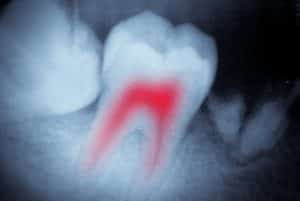 For many people, the words “root canal” send a shiver down the spine. This is unfortunate, because the procedure is actually safe, comfortable, and essential for addressing serious oral health concerns, such as an infection or abscess. What should you expect from a root canal? When will the doctor recommend this endodontic treatment to save your tooth?
For many people, the words “root canal” send a shiver down the spine. This is unfortunate, because the procedure is actually safe, comfortable, and essential for addressing serious oral health concerns, such as an infection or abscess. What should you expect from a root canal? When will the doctor recommend this endodontic treatment to save your tooth?
Warning Signs of Trouble
How do you now if you have an infection? Initially, you may notice sensitive teeth or even a persistent toothache. As the issue progresses, you may experience pain when biting down or chewing. Swelling near the tooth, fever, and a foul-tasting discharge are also possible indicators of an infected or abscessed tooth. If you think one or more of these possible warning signs sound familiar, then please contact our office today. We can examine your smile and see if you require endodontic treatment to preserve your tooth.
Receiving a Root Canal
First, we will apply a local anesthetic to ensure you’re comfortable. If you feel anxious, we can also discuss sedation dentistry. We then open the tooth to remove the infected tissue within. After removing this tissue, we clean the inside of the tooth, including the root canals. The doctor will place a restorative material known as gutta percha inside the tooth. After the material cures, we will need to place a restoration.
Restoring Your Tooth
The final step of the procedure involves placing a dental crown. The crown covers the visible portion of the tooth, protecting it from further decay or infection. The crown is created using lifelike materials, such as ceramic. The ceramic we use is stain-resistant, durable, and can mimic the appearance of natural tooth enamel. No one will be able to tell you’ve had work done on your tooth.
James Stewart, DDS, and our team can help restore oral health with a root canal. We serve patients of all ages from Livonia, MI, as well as Farmington Hills, Farmington, Plymouth, Northville, Novi, Dearborn Heights, Dearborn, Garden City, Westland, Redford, and the surrounding communities. To schedule a consultation, call our office today at (734) 425-4400.


